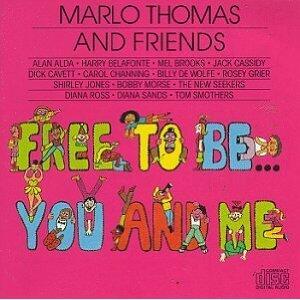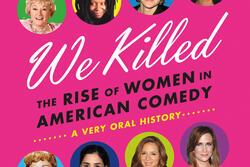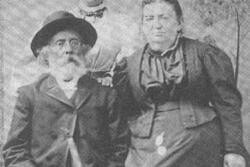45 Years of Free to Be You and Me
Letty Cottin Pogrebin was the editorial project consultant for "Free to Be You and Me" album, released on November 27, 1972, as well as the book and television special associated with the project. Created by feminist and actress Marlo Thomas, "Free To Be You And Me" is an album of non-sexist stories and songs for that have helped shape the worldview of a generation of children.
When he was three, my son, Jacob, asked for Baby All Gone for Hanukkah. And I couldn't have been prouder.
Blame it on “Free to Be You & Me.” Like many of my generation, that album belonged to the soundtrack of my formative years. Teaching about gender equality in an informal and natural way, the songs and vignettes were snappy, clever, and extremely memorable.
One song left a lasting impression on me. Based on a book by the same title, “William’s Doll” offered the radical premise that if boys are expected to be nurturing fathers, they ought to be given equal opportunity to practice during their creative play.
So, when Jacob asked for Baby All Gone, I smugly added it to his wish list. Clearly my efforts to discourage gender-based stereotypes had taken hold.
"Free to Be You and Me" was a daring and innovative offering, raising important points regarding gender-equality at a time when women were trying to balance their desires with societal expectations. It was revolutionary and helped to instill in my generation the knowledge that all choices were available to both genders.
The passage of time has not diminished the strength of its messages. My fourteen-year-old daughter, Lilly, has fond memories of the CD and regards it as having formed the foundation of her feminism. She is quick to point out, however, that there is room for an update that would speak to a society where some daddies were actually girls when they were little, same-sex couples have equal rights, and not everyone desires to be a parent. "Just like ‘Free to be You and Me’ helped normalize women's equality at a time when women were just emerging as equals and other gender issues” Lilly reflected, “imagine how an update could help normalize so many of the societal realities that are part of my generation."
Imagine, indeed.
I assumed, wrongly as it turned out, that because my parents had played the album for me when I was young, that they espoused all the messages it contained.
When my mother told me that she had purchased the kids' gifts, including the doll, I remarked how thrilled Jacob was going to be with his present. Deafening silence. Then my mom admitted that she thought that my daughter had requested it and had she realized it was for Jacob, she would have gotten him something else.
I was confounded by her response. Hadn't she encouraged this very type of open-mindedness? Perhaps what is true in theory is more difficult in practice.
Hanukkah arrived and so did the doll. It was a gift that sent him to previously-unknown heights of delight. For the first few days, the two of them were inseparable. He was attentive to her every need. He fed her. Gave her a bottle. Sang her to sleep. And though the doll doesn’t make crying sounds, Jacob would come running when he “heard” her crying.
“It’s ok, sweetheart, Daddy’s here.”
Oh, how Jacob loved that doll! For that first year, he cared for her, answered her every cry, changed her clothes, and showed her so much love. Yet one thing continued to mar this perfect relationship: Baby All Gone continued to call him “Mommy.”
One morning, in a burst of frustration, Jacob yelled, “Why can’t you remember that I’m Daddy?!?”
Why, indeed. It’s not Baby All Gone’s fault. Despite assurances from the 1968 Virginia Slims marketing campaign that we've come a long way, we haven't made much movement in this area. It's been 45 years since Alan Alda and Marlo Thomas introduced us to William and his doll. Yet Baby All Gone continues to be preprogrammed without any awareness by toy companies that boys can (and should) play with dolls. Toy companies make dolls that reflect different ethnicities and even different abilities, they should also create dolls who will find nurturing from parents of any gender.
In her essay on the 35th anniversary of the release of "Free to Be You and Me," JWA’s now Executive Director, Judith Rosenbaum, wistfully remarked, "I find the energy and earnestness of the album moving, not nauseating...I think that's what I'm most nostalgic for when I listen to "Free to Be You and Me"––a time when people believed they could change the world through kids' music."
The revolution that “Free to Be You and Me” ushered in has been quiet, subtly shifting, in its gentle and loving way, several generations. Forty-five years later, this album has continued to coax change out of long-held assumptions, transforming the world into a more hopeful and compassionate place.
Several years have passed. Baby All Gone spends most of her time in a drawer.. But every once in a while, I hear the soft sounds of comfort as my now 10-year-old son croons her to sleep and think, "he’s going to be a great dad someday."








viagra girl
buy viagra online cheap http://canadian-pharmacye.com